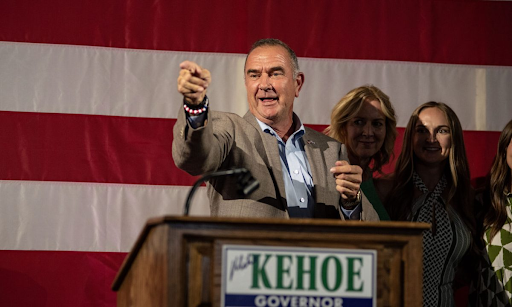The Precedent Set by Missouri’s Redistricting War
Pictured, Republican Missouri Governor Mike Kehoe signed the widely controversial Missouri Redistricting law backed by President Trump. Source: The Beacon News
On September 12th, Missouri became the latest state to redraw its voting patterns under the backing of President Trump. This plan, implemented by Republican lawmakers, aims to redistrict Missouri so that Republicans retain seven of eight congressional districts, a small piece of the redistricting puzzle that strives to help Republicans hold the House amidst a presidency that has lost seats in the past midterm elections. This is particularly critical as the Democratic Party only needs three seats to control the House, which would allow them to weaken agenda plans and launch investigations into Trump’s presidency.
The redistricting map, proposed by Gov. Mike Kehoe during a special session, would weaken Rep. Emanuel Cleaver’s Kansas City District by adding more rural areas. Cleaver’s district has historically been composed of 20% Black and 11% Hispanic residents, and he has pledged to fight back against the map with an intention to seek reelection. The map set forth has been met with three lawsuits to block it from going into effect, which have ranged from leaning on the unconstitutionality of the map itself to trying to sue Kehoe for calling lawmakers into a special session ahead of the official census date. More specifically, the ACLU Voting Rights Project and ACLU Missouri have called this a “nationwide gerrymandering arms race” in which the voices of Americans are set to be unfairly represented.
Missouri is not the first state to move into special sessions ahead of the official redistricting date (the 2030 census) to gain seat advantages. Texas already redrew its congressional map designed to flip five democratic seats in the 2026 midterm elections in August. Furthermore, Ohio, Alabama, Georgia, Louisiana, Tennessee, Florida, and Utah are all on the road to change their state legislative maps through either voluntary restriction or litigation changes.
To combat the Republican agenda, Democrats have set their sights on California, aiming to redraw the congressional map to favor democrats for the next three election cycles. Proposition 50, put forth by Governor Newsom and the California Legislature, is set to appear on a special ballot in November. If passed, it would enable lawmakers to formally redraw the congressional districts by evading the California Citizens Independent Redistricting Commission. Beyond legislative support, California’s redistricting efforts have also been met with $44 million dollars of financial support which is further compounded through Liberal billionaire Tom Steyer’s recent announcement to pledge $12 million to back the effort.
This partisan push towards redistricting has caused a series of fierce political debates, as some have argued that states should keep redistricting to their set census date schedule. States are technically required to uphold the Voting Rights Act, which should protect voters and discourage dilution of votes through the gerrymandering process. However, with infamous cases such as Shelby County v. Holder and state processes of limiting the law's protections, the efficacy of this law is questionable. In October, the Supreme Court is set to hear a case specifically about racial gerrymandering in Louisiana, which will allow the Court to zero in on the Voting Rights Act (VRA) and its potential violation of the 14th and 15th amendments. This ruling has the potential to cut the VRA and its protections overall, which has been an implied conservative goal to enhance the Trump agenda.
Whether it is to be considered gerrymandering or not, redistricting plans such as those of Missouri set the precedent for partisan extremism in America, in an already polarizing period of US history. As seats are fiercely fought for by both parties, the very voter protections that make up American democracy are in danger. Beyond congressional numbers, redistricting itself also divides communities along minority lines and weakens individual political influence by placing political power above community power. Redistricting along partisan lines sets the stage for a future of division that may become irreversible.

